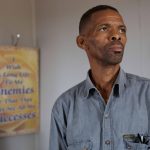Justice Cameron’s farewell backs labour tenants
The Constitutional Court has ruled in favour of a ‘special master’ being appointed to expedite more than 11 000 land claim applications, many of which were lodged more than two decades ago.
Author:
21 August 2019

To say the Constitutional Court was full to capacity on 20 August would be an understatement. The head of security and members of the South African Police Service, time and again, had to stop people from entering the court gallery because there was no space. They had to direct people to the foyer to watch the live streaming of the proceedings. The upstairs media room was also full, one could barely move, with photographers having to work really hard for a picture of the court sitting.
Many gracing the Constitutional Court were there to bid farewell to one of the most outstanding human beings to preside as a constitutional judge, Justice Edwin Cameron, who has retired after 25 years on the bench.
The court attendance clearly illustrated that Cameron had touched many people, not just through progressive jurisprudence but also through his activism for social justice and equality.
Many hail the South African Constitution as the best democratic document in the world. It denounces homophobia, for one. It is through the work of activists such as Cameron that Section 9 of the Constitution expressly states that no one can be discriminated against on the basis of their sexual orientation.
Cameron’s spirit of activism in defending anti-apartheid activists and social justice didn’t end in 1994. He continued to champion the struggle of the most vulnerable, particularly those living with HIV and AIDS, when the state and pharmaceutical companies frustrated the attempts of the working class to gain access to antiretroviral (ARV) treatment in the late 1990s.

Bravery and selflessness
Chief Justice Mogoeng Mogoeng opened the special sitting with a speech, saying Cameron was a “brave” and “selfless” human being. “When HIV attracted stigma,” he said, “he stood up and declared openly ‘I am HIV positive’. He knew the attitude of many South Africans at the time.”
Cameron was prompted to disclose his HIV status in 1998, when a community in Kwazulu-Natal “stoned and stabbed” Gugu Dlamini to death for publicly disclosing her HIV status over the radio.
Related article:
On his last day as a judge of the Constitutional Court, Cameron demonstrated the kind of bravery the chief justice spoke about by affirming the rights of labour tenants.
The Supreme Court of Appeal had reversed the order of the Land Claims Court, that mere supervision of the Department of Rural Development and Land Reform had failed and warranted an intervention of “a special master” to help fast-track the applications by labour tenants.
The appeals court viewed the decision of the Land Claims Court as a “gross intrusion by a court into the domain of the executive”, as the special master will inevitably be entangled in “budgetary and operational issues” of the department. The appeals court considered the idea of a special master as a foreign import. It argued that a senior manager in the department had to be appointed to oversee the Labour Tenants Act process.
Labour tenants and non-governmental organisation the Association For Rural Advancement (Afra) approached the Constitutional Court on the basis that the appeals court had misdirected itself in understanding the magnitude of the problem.

Labour tenants in limbo
More than 11 000 applications by labour tenants for ownership of land have not been processed. The Legal Resources Centre (LRC) took on the matter as “a class action – on behalf of all labour tenants that made these applications”, explained Thabiso Mbhense, an LRC attorney who represents labour tenants.
He added that they included “people who work on farms. A number of them have died. Some of them are facing evictions, some of them are denied the right to bury their loved ones on farms. Some of them … don’t have access to water.”
Anele Mehlo, 38, labour tenant and a seasonal farmworker from the Western Cape said: “There are illegal evictions – we have been going to courts – but they don’t want to apply Section 25. That’s why we say, we [are] claiming to have democracy in South Africa but as land tenants, we have no democracy, because after your in-service after 30 years on a farm, they chase you out. And that is an illegal eviction. And we see that there is no justice for us … Our focus is to get the land back. The land tenants must have rights to produce their own food.”
Related article:
Before Afra and labour tenants demanded a special master to intervene, the department had breached a number of court orders requesting it to produce hard statistics of outstanding labour tenants’ claims.
After a year of promising to comply with an order, “the department estimated that it would need two more years just to capture the details of thousands of applications still outstanding. This suggested that the department was itself unable to determine how big a problem confronted it. Even after the department’s records were revealed as non-existent or shambolic, it continued to proffer repeated undertakings to comply with the Land Claims Court orders – but continued repeatedly to breach them,” wrote Cameron.
A more radical intervention was sought to deal with the backlog.

Impossible backlog
“Nearly 11 000 applications remained to be settled. If each took only one day to process, the load would take about 24 years for the department to surmount, including work on weekends – and, without weekend work, 40 years. A special master, the Land Claims Court concluded, could assist the department to develop a comprehensive strategy for the efficient processing and referral of claims, to deal with lost applications … If a special master working with the department could achieve what the department on its own had not, the appointment was ‘more than justified’.”
For Cameron, the special master was not an import and did not intrude into the domain of the executive unjustifiably. He argued that the appeals court was misdirected in saying that the Land Claims Court violated the principle of separation of powers. This is because the Land Claims Court had set the scope of the special master and directed the process it should follow.
In a nutshell, Cameron concluded that the special master was not an independent institution dictating to the executive what to do, but an “agent of the court and acts in extension of the court’s own supervisory jurisdiction”.
For Mbhense, “Once they get land, nobody is going to harass them because they will be owners of that land. If the department processes their applications, then they will be able to get land.”
The application against the appeals court judgment was successful.
Related article:
In his findings in favour of the labour tenants, Cameron said: “The department has jeopardised not only the rights of land claimants, but the Constitutional security and future of all. South Africans have been waiting for more than 25 years for equitable land reform. More accurately, they have been waiting for centuries before.
“The department’s failure to practically manage and expedite land reform measures in accordance with constitutional and statutory promises has profoundly exacerbated the intensity and bitterness of our national debate about land reform.
“It is not the Constitution, nor the courts, nor the laws of the country that are at fault in this. It is the institutional incapacity of the department to do what the statute and the Constitution require of it that lies at the heart of this colossal crisis.”
As the old saying goes, judges do not retire. Cameron will continue his work of activism and social justice.




